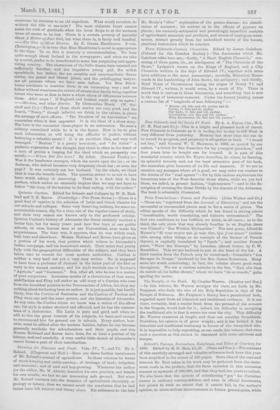Quintus Curtius. Edited for Schools and Colleges by W. E.
Holt- land and T. E. Raven. (Cambridge : Pitt Press Series.)—There is a good deal of caprice in tho selection of Latin and Greek classics fur our schools and colleges. Some very deserving authors, for some un- accountable reason, slip for a time out of the regular course of study, and their very names are known only to the professed scholar. Quintus Curtius's history of Alexander the Great certainly merited a better fate, but for many years past how few boys at our public schools, or even honour mon at our Universities, over made his acquaintance. The time was, it appears, that ho was widely road, both here and elsewhere. Messrs. Heitland and Raven have given us a Portion of his work, that portion which relates to Alexander's Indian campaign, and his homeward march. Their notes deal pretty fully with the geographical difficulties of the subject, and they have taken care to consult the most modern authorities. Curtius is neither a very hard nor yet a very easy writer. Ho is supposed to have been a professor of rhetoric in the latter part of the first or early in the second century, and his style reminds one of Tacitua's 'Agricola " and " Germany." But, after all, who he was is a matter of pure conjecture. Suetonius speaks of a rhetorician of that name, anddracitus and Pliny tell rather an odd story of a Curtius who rose from the humblest position to the Proconsulate of Africa, but they say nothing about his having been an author. It is just possible, but hardly likely, that the Curtius of Suetonius and the Curtius of Tacitus and Pliny were one and the same person, and the historian of Alexander. At any rate, the Curtius whom wo know was a writer of the silver age, his style is rather strained and affected, and he has the manner- isms of a rhetorician. His Latin is pure and good, and when we add to this the groat interest of his subjects, wo have said enough
to recommend him for general use in schools. Every author, how- ever, must ho edited after the modern fashion, before he can become generally available for schoolmasters and their pupils, and this Messrs. Heitland and Raven have done, for at least a portion of his history, well and carefully. A very useful little sketch of Alexander's career forms a part of their introduction.


































 Previous page
Previous page